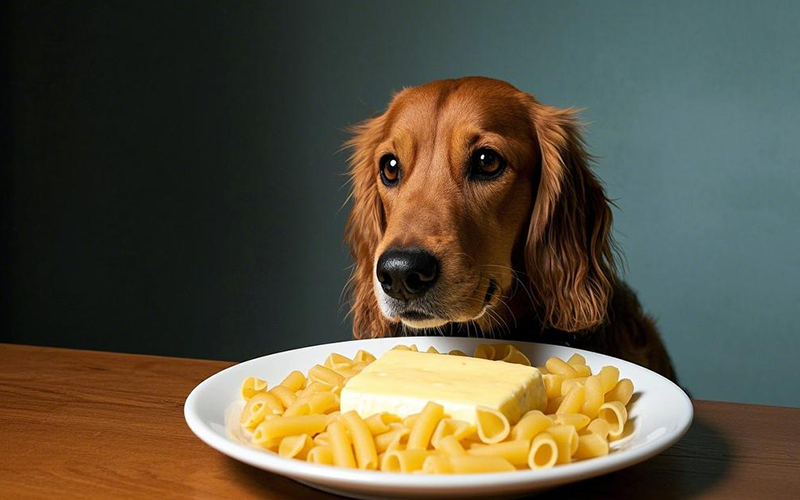Can Dogs Eat Mac and Cheese? Here's What You Need to Know
- 20 Mar 2025 09:51
Mac and cheese is a comfort food many people love, but when it comes to feeding your dog, mac and cheese isn’t the best choice. While it might seem harmless, this popular dish is full of ingredients that can be harmful to dogs. Let’s explore why mac and cheese is not safe for your furry friend and what alternatives you can offer. 🍝🚫🐾

Why Mac and Cheese is Not Safe for Dogs 🐕
Dairy Ingredients 🧀
Mac and cheese is made with milk and cheese, which are dairy products. Many dogs are lactose intolerant, meaning they can't properly digest lactose, the sugar found in milk. Consuming dairy products can lead to stomach upset, including diarrhea, bloating, and gas. Even dogs who aren't severely lactose intolerant might experience mild discomfort after eating dairy.High Fat and Calories 🍽️
Mac and cheese is often made with butter or cream, which adds a lot of fat and calories to the dish. While a small amount of fat is necessary for a dog's diet, too much can lead to obesity and other health problems, including pancreatitis, an inflammation of the pancreas that can be very serious.Seasonings and Additives 🌶️
Mac and cheese recipes usually include seasonings like salt, garlic, and onion powder. Garlic and onions are toxic to dogs and can cause damage to their red blood cells, leading to anemia. Excess salt can cause dehydration, kidney problems, and other health issues for dogs. Even if your mac and cheese doesn’t contain garlic or onions, the added salt can still pose a risk.Processed Cheese 🧀
Processed cheese, commonly used in mac and cheese, often contains artificial flavors, preservatives, and colorings. These additives are not ideal for your dog and can lead to digestive upset or allergic reactions. Additionally, the high fat content in processed cheese can contribute to weight gain if consumed regularly.
Symptoms of Eating Mac and Cheese for Dogs 🚨
If your dog has eaten mac and cheese, especially in large quantities, it’s important to keep an eye on them for any signs of distress. Symptoms of a stomach upset from dairy or high-fat foods can include:
Vomiting 🤢
Diarrhea 💩
Excessive drooling 🤤
Bloating or discomfort 🤕
Lethargy or weakness 😴
If you notice any of these symptoms after your dog eats mac and cheese, contact your vet for advice.
How Much Mac and Cheese is Dangerous? ⚖️
A small bite of mac and cheese is unlikely to cause immediate harm, but regularly feeding it to your dog can lead to long-term health issues such as obesity, gastrointestinal problems, or pancreatitis. If your dog consumes a large portion or experiences signs of distress, it's best to reach out to your vet.
What Are Some Safe Alternatives to Mac and Cheese? 🐾
If you're looking for dog-friendly treats that won’t upset their stomach or harm their health, here are a few safe alternatives:
Plain Cooked Pasta 🍝
Plain, cooked pasta (without sauce or seasoning) is a safe option for dogs in moderation. Pasta is low in fat and can be a fun treat for dogs who enjoy carbs. Just be sure to serve it without any harmful additives like garlic or cheese.Rice and Chicken 🍗
A simple dish of plain rice and chicken (no seasoning or sauces) is often recommended for dogs with digestive issues. It’s easy to digest and gentle on the stomach.Carrots 🥕
Carrots are a healthy, low-calorie snack that many dogs love. They’re great for dental health and can help satisfy your dog’s need to chew.Sweet Potatoes 🍠
Sweet potatoes are packed with nutrients like fiber, vitamins A and C, and can be a great addition to your dog’s diet. Cook them without any added salt or butter, and they’ll be a healthy, dog-friendly treat.Peanut Butter 🥜
Unsweetened, xylitol-free peanut butter can be a tasty treat for dogs. It’s rich in protein and healthy fats. You can spread it on a toy or use it in homemade dog treats.
How Technology Can Help With Pet Health 🧠
If you’re unsure whether a certain food is safe for your dog or need assistance with their diet, consider using PettureX, a pet AI software that provides 24-hour online consultations and pet image recognition. PettureX can help you make informed decisions about your dog’s health and nutrition. 📱🐾
Final Thoughts: Can Dogs Eat Mac and Cheese?
While mac and cheese may be a delicious treat for you, it’s not a safe or healthy option for your dog. The high dairy, fat, salt, and seasoning content can lead to stomach upset, obesity, and even more serious health concerns over time. Always opt for safer, healthier treats and meals for your dog, and remember to monitor them for any signs of distress if they accidentally eat something they shouldn’t.
For reliable guidance on your dog’s health and diet, PettureX is here to help with expert advice and resources. Keep your dog’s meals balanced and nutritious to ensure they stay happy and healthy! 🐕🌟
Related

Why is Regular Dog Grooming So Important?
- 21 Jun 2025
Can Dogs Eat Kiwis? A Vet-Approved Guide to This Fuzzy Fruit
- 10 Jun 2025
Can Dogs Eat Curry? Unpacking Risks, Benefits, and Safe Alternatives for Your Canine Companion
- 3 Jun 2025
Can Dogs Eat Cooked Carrots? A Crunchy & Colorful Canine Query!
- 29 May 2025
Can Dogs Eat Cooked Cabbage? Unveiling the Crunchy Truth for Your Canine!
- 29 May 2025
Can Dogs Eat Citrus? Peeling Back the Zesty Truth for Your Pup!
- 28 May 2025
Can Dogs Eat Cinnamon Applesauce (A Little Bit)? The Sweet and Spicy Truth!
- 28 May 2025
Can Dogs Eat Chorizo? Sizzling a Warning for Your Furry Friend!
- 27 May 2025
Can Dogs Eat Chili? A Spicy Topic for Canine Consumption!
- 27 May 2025
Can Dogs Eat Raw Chicken? Unveiling the Risks and Realities
- 26 May 2025
